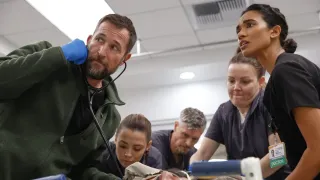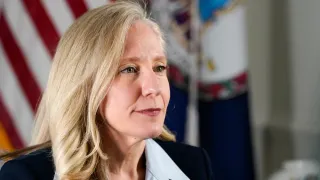December 2, 2023
For a Male Sexual Assault Survivor, Justice Won in Court Does Not Equal Healing
Jeff McMillan READ TIME: 4 MIN.
Schultz, now 37, described a wrenching and maddening journey from assault, when they were just 23, to adjudication and beyond.
Schultz was an aspiring opera singer and a graduate student at Houston's Rice University when they met David Daniels, a famous countertenor, and Scott Walters, a conductor, through the city's music circles. Schultz remembers admiring Daniels for being a "proud gay man" in a conservative art form.
The two invited Schultz to the closing of the Houston Grand Opera's "Xerxes," in which Daniels was starring, Schultz said. Later that night at a cast party, the couple invited Schultz to their apartment afterward, cautioning the young singer not to tell anyone, lest others get jealous.
Schultz was handed a drink and later woke up in an unfamiliar room, naked and bleeding. Shock and then fear set in.
Schultz discussed the assault with relatives, friends and a therapist but didn't go public until 2018, when the #MeToo movement provided more comfort in making a report.
Daniels and Walters were arrested in 2019 and maintained the encounter with Schultz was consensual until, just as the two were going to trial on charges of first-degree aggravated sexual assault, they accepted a deal to plead guilty to sexual assault of an adult, a second-degree felony. Both were sentenced to eight years' probation and required to register as sex offenders.
The men still tell others in the opera community that they aren't guilty, Schultz said, and that the plea was just to avoid prison. Schultz saw others in the opera community rally around the attackers, and was criticized for besmirching the reputation of prominent gay men.
Ted Gideonse, an associate professor of teaching of health, society and behavior at the University of California, Irvine, public health program, noted that for gay and bisexual men, lines of consent have been historically muddy. That doesn't make it right. The longtime illicit nature of sexual encounters between men meant that by necessity they had to be coded.
Schultz sees some signs of things changing for men who report abuse.
Just last month, the BBC published a report after a two-year investigation that uncovered stories alleging that Mike Jeffries, the former CEO of clothing retailer Abercrombie & Fitch, used a middleman to exploit young adult men for sex at events he hosted at his home in New York and at hotels in Paris, London and elsewhere.
A dozen men described events involving sex acts that were run for Jeffries and his partner, Matthew Smith, from 2009 to 2015. Jeffries stepped down from Abercrombie & Fitch in 2014.
After Schultz first told their own story, a man in his 60s heard it on the radio and realized he had been sexually assaulted in college, too.
"He wrote to me that he broke down crying at the breakfast table and for the first time started to understand what had happened to him when he was in college," Schultz said. "And I think a lot of men push experiences away so they don't ever have to deal with them."






